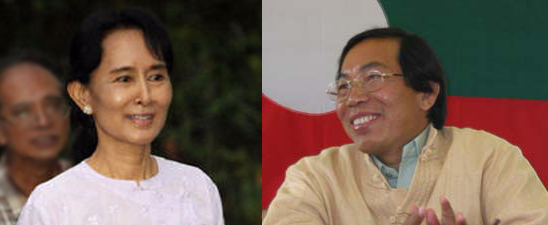Lt-Gen Yawd Serk, leader of the anti-Naypyitaw Shan State Army (SSA) ‘South’, in response to Burma’s pro-democracy Daw Aung San Suu Kyi’s call for “a second Panglong conference”, ...
Lt-Gen Yawd Serk, leader of the anti-Naypyitaw Shan State Army (SSA) ‘South’, in response to Burma’s pro-democracy Daw Aung San Suu Kyi’s call for “a second Panglong conference”, says he is still worried about her security and whether she will be able to hold the “21st century Panglong conference” because she will be under 24-hour surveillance by the ruling military junta.
 “Her release doesn’t mean she can do everything she wants. It has limitations. So I am not sure whether she can move around freely or not because she will be followed by the ruling military either directly or indirectly,” Yawd Serk said.
“Her release doesn’t mean she can do everything she wants. It has limitations. So I am not sure whether she can move around freely or not because she will be followed by the ruling military either directly or indirectly,” Yawd Serk said.
Daw Aung San Suu Kyi, at the public gathering held yesterday, said that she is willing to call a 21st century “Panglong Conference” as mentioned earlier in 1989.
“I am therefore concerned how much she will be able to work for the ethnic peoples,” he said.
Nevertheless, Yawd Serk urged all people from Burma including ethnic nationalities to protect Daw Aung San Suu Kyi and continue supporting her because she is the only one who can lead the way in the implementation of the Panglong Agreement, which was signed between her father Aung San, who represented the Burmans, and leaders of Shans, Kachins and Chins in 1947.
“The root cause of the political problems in Burma is that the Panglong Agreement has been neglected and violated by the military junta. The problems between the ethnic groups and the Burmese Army will never come to an end if the Agreement is still ignored,” said Lt-Gen Yawd Serk.
“But to implement it, only Daw Aung San Suu Kyi can play the central role. Without Suu Kyi, nobody is going to believe the junta.”
The Panglong Agreement promises “Full autonomy in internal administration” and “rights and privileges which are fundamental in democratic countries.”
According to him, Daw Aung San Suu Kyi also needs to promote participation of the ethnic nationalities to build a genuine union. “Without ethnic participation, it will be difficult to resolve the problems of Burma.”



